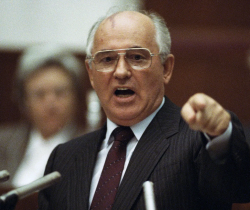Mikhail Gorbachev died last week at 91 years of age, marking the official end of the Cold War era, one of the most consequential periods in world history and one in which the two superpowers and their allies at times came close to a devastating war.
The “Gorbasms” began almost immediately.
The late Rush Limbaugh popularized the term on his radio program to describe the fawning coverage given to Gorbachev by Western media, designed to make us believe that he alone was responsible for the ultimate implosion of the Soviet empire and the promise of a conflict-free world.
Most media outlets in the 1980s and 90s went to great lengths to avoid making any sort of judgement on the relative merits of the socialist and capitalist systems, unwilling to even consider that any credit should go to the efforts of the United States and our allies.
Corporate media stayed true to form at Gorbachev’s passing, wasting no time with the predictable shaping of history to their liking, suggesting that Gorbachov alone was responsible for ending the Cold War.
CNN’s web site led the wave of unashamed adulation: “Mikhail Gorbachev, former Soviet President who took down the Iron Curtain, dies.” The Associated Press got out the rhetorical kneepads, breathlessly declaring, “Mikhail Gorbachev, who died Tuesday at 91, is being saluted as a a rare leader who changed the world.” The New York Times was at least honest enough to mention the failure of communism, however obliquely. “Adopting principles of glasnost and perestroika, he weighed the legacy of seven decades of Communist rule and set a new course, presiding over the end of the Cold War and the dissolution of the U.S.S.R.”
Left out of the headlines is that the reforms Gorbachev instituted were an effort to save Communism, not end it. No mention of his insistence that the United States give up the Strategic Defense Initiative, leaving us vulnerable to nuclear weapons. (sadly, we still are) And God forbid there should be any mention in the headlines of Ronald Wilson Reagan, whose defense policies and challenges to the Soviets in this hemisphere were the final blows to Soviet dreams of empire.
Left unsaid was the role played by the United States and its Western Allies in containing and eventually beating back the Soviet empire, engaging in what John Kennedy called the “long twilight struggle” against the ideology that assured us that God was dead, private property was evil, and that the future would be led by the workers of the world. (By which they really meant the Soviet Politburo and the KGB)
You’re not going to find many mentions of the beginning of the Cold War when, after the devastation of the Second World War, the Soviets moved quickly to enslave Eastern Europe, engaged in espionage against us that resulted in them gaining nuclear weapons faster than they should have, and tried to starve West Berlin into submission because its citizens wanted no part of the police state the Communists were building.
You certainly won’t often read about the West’s reaction to Soviet aggression in the immediate post-war era. Little will be written about the formation of the North American Treaty Organization, the Berlin Airlift, or the bipartisan consensus in the United States to resist what so many on the left considered the inevitable march of history.
There won’t be many kilobytes, column inches, or television news shows devoted to, for instance, the United States success with the U-2 spy plane that kept our leaders informed throughout the late 1950s, allowing us to continue in our efforts against Communism without starting a world war.
Precious few of our pundits will dwell upon the enormous amounts of treasure we spent battling the forces of Communism, the not insignificant amount of American blood spilled, or the efforts in the last part of the 20th Century to preserve liberty in lands far away from home.
The people who propagate these historical calumnies are either too young to have any real knowledge of the Cold War, still too invested in the idea that socialism is really the wave of the future, or too dishonest to admit that we really were on the right side during the Cold War.
The people unwilling or unable to be honest about the Cold War are the same fabulists that would have you believe that there were no Soviet agents in our government during the beginnings of the Cold War, the same people who insisted—without any credible evidence—that John Kennedy’s murder was the result of the “climate of hate” that was everywhere in 1960s America, not a committed Communist, the same people who issue dire warnings that every popular conservative leader from Barry Goldwater to Donald Trump is the second coming of Adolph Hitler.
The truth is that the Soviet empire was a system destined to fail, and the only way it could achieve world hegemony was to use aggression when it could get away with it, and employ deception and sowing discord in Western democracies when it couldn’t.
By the 1980s, it was obvious that Marxist-Leninism failed dismally in its attempt to provide a better standard of living for its citizens. But all too many true believers among our leftist friends were convinced that a system that couldn’t feed its citizens—or even keep them in the country without barbed wire, machine guns, and thuggish police—really was the inevitable direction of history.
(For an excellent history of Communist apologists in the last half of the 20th Century, consult Mona Charen’s “Useful Idiots: How Liberals Got It Wrong In The Cold War And Still Blame America First.” For younger readers especially, it’s an eye-opener)
The economic failure only became obvious to the left after the Berlin Wall came down, Eastern Europe was liberated, and the Soviet Union ceased to exist.
All of a sudden, the failure of state-run economies became apparent to every liberal in the country, because it could be used as a political weapon. The new conventional wisdom was that Western resistance had nothing to do with the implosion of the Soviet regime.
No, the problem was that the Soviet system was a victim of its own “internal contradictions” that made its economic model untenable. The new explanation was that the Soviet system would have failed all on its own, without any interference or resistance from the West.
All true, but when this Communist collapse was to take place was always a little vague in the left’s explanations. It could have been the 1980s, or the early 21st Century; hard to tell. Just understand that the amiable dunce, that cowboy Reagan, had nothing to do with it.
The truth is that the United States and its Western Allies, through their steadfast opposition to communist encroachment and aggression, were the decisive factor in the defeat of Soviet Communism.
Through eight presidential administrations, economic highs and lows, domestic turmoil, the chaos of Watergate, and our cities going up in flames during the 1960s, our national leadership kept its eye on the greater threat to Western Civilization. (Even liberal Democrats remained committed—before 1972)
To be sure, there were mistakes made along the way. Viet Nam was the result of a sad, complicated policy-making process that probably didn’t need to happen. There was naive, hubristic meddling in parts of world we knew little about. Sometimes we found ourselves with little alternative but to ally ourselves with regimes and/or individuals that, as a basically decent people, we would shun if encountered in our daily lives.
But without the efforts of the United States and our Western Allies, without our matching the Soviets militarily and developing a policy of containment and, in the Reagan years, actual rollback, the Soviet Union would have suffered much less stress to an inferior economic system and been able to survive well into the 21st Century. Anyone trying to insist otherwise is ignorant or lying—or both.
Mikhail Gorbachev didn’t make history. He merely acknowledged it.









